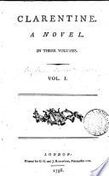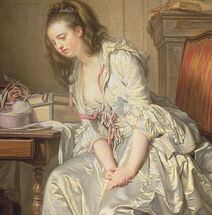
Waldron says Clarentine is a girl who, “despite temptations, never deviates, even in thought, from the accepted path of right conduct.”
While “pictures of perfection” heroines in Georgian literature were a thing, I don’t agree that Clarentine is one of them. It’s not just that, by modern standards, she is ridiculous. It is that there are a sensible people within the novel who can see she is being ridiculous.
Clarentine, like Fanny Price, manages to make timidity look like hauteur. When Clarentine goes to live with her guardian’s old tutor, she trembles as she descends from the carriage:
| Clarentine’s heart failed her as the moment drew near that was destined to introduce her to the strangers she was henceforward to reside with… she stopped at the bottom of the steps and said with a half smile – 'It is very foolish, but indeed, Mr. Lenham, I am almost afraid of venturing farther.' Mr. Lenham laughed at her apprehensions, yet with great kindness said – 'Shall I go in first then, and announce your arrival?' Glad of any reprieve [Clarentine] eagerly accepted the proposal, and struggling to gain courage during his absence, was able when he returned to accompany him onto the room with tolerable composure. |
And may I suggest, dear reader, that only very pretty girls can get away with this kind of crap? Anyway…

Fanny is described as struggling against low spirits and sometimes jealousy, as does Clarentine. Mr. Lenham, seeing her melancholy state, (and no doubt tired of having a moody teenager moping around the house) begs her to confide in him, but she protests, “mine is a secret that ought not to be told.”
“You amaze me,” [Mr. Lenham] cries. “What secret can be deposited in a heart so guileless and so pure as your’s, that you need blush to reveal?”
“Alas, Sir!” exclaimed Clarentine, sighing, “how little you suspect the state of that heart you seek thus benevolently to penetrate. It is filled at this moment with every evil passion. Pride, resentment, envy and ingratitude, assail it by turns; and, oh, Sir, assail it so forcibly, that I know now how to repel them!”
When her secret love for her guardian causes Clarentine to fall ill, her neighbor Mrs. Denbigh upbraids her and advises her to get over herself: "Is your case, my young friend, a new one? Oh no! – how many notable and contented old women there now are, attending daily to the domestic occupations of their household, scolding their maids, whipping their children, snarling at their husbands, and sitting in judgment upon their neighbours, who once, like you, were sunk in listlessness and apathy, and thought no pleasure equal to that of elegantly indulging their romantic despondence!”
Clarentine protests that, given her situation as a friendless, dependent orphan suffering the pangs of unrequited love, it is only natural that she should be sunk in misery, but the brusque but kindly Mrs. Denbigh interrupts: “A fatal tendency to encourage causeless repinings seems to have been your bane through life.”

In each of these novels, there are conversations (or a letter, in the case of Pride & Prejudice) where the heroine is told she is wrong.
But there are no such conversations in Mansfield Park. On the contrary, the people who tell Fanny she is wrong, are wrong themselves. Edmund hopes Henry Crawford will “succeed at last” in winning her hand: “You have proved yourself upright and disinterested, prove yourself grateful and tender-hearted; and then you will be the perfect model of a woman which I have always believed you born for.” Sir Thomas thinks she turned down Henry Crawford because she is "willful and perverse." He’s very wrong about her character and her motives. And everyone is wrong about the Crawfords, and Fanny is eventually vindicated.
In Mansfield Park, there is only the merest hint that Fanny has created some of her own problems, or made them worse, because of her temperament: “As usual, believing yourself unequal to anything! fancying everything too much for you!" Edmund exclaims at one point. Here, Fanny compares herself with her younger sister: “Susan was only acting on the same truths, and pursuing the same system, which her own judgment acknowledged, but which her more supine and yielding temper would have shrunk from asserting. Susan tried to be useful, where she [Fanny] could only have gone away and cried.”
The narrator makes essentially the same point during the wrapping-up: when Susan (lucky girl!) is established at Mansfield as Lady Bertram’s unpaid companion: “Her more fearless disposition and happier nerves made everything easy to her there. With quickness in understanding the tempers of those she had to deal with, and no natural timidity to restrain any consequent wishes, she was soon welcome and useful to all…” (And, to be fair, no Mrs. Norris to cope with).
Fanny's timidity is referred to as a fact, more than as a fault, it seems to me.
Poor Fanny does not have a Mrs. Denbigh in her life, and she could use one. In my variation on Mansfield Park, A Contrary Wind, I did supply Fanny with a foil, and it just so happens that it is a brusque but kindly widow.
Previous post: The Faults of Fanny Next post: Death and Coincidence, part one
Dorothea Sofia-Rosselini's variation on Persuasion is witty, daring and whimsical, a quite unique variation of Jane Austen fan fiction for die-hard Austenites. I'm glad to see it's now available in ebook, too.

 RSS Feed
RSS Feed